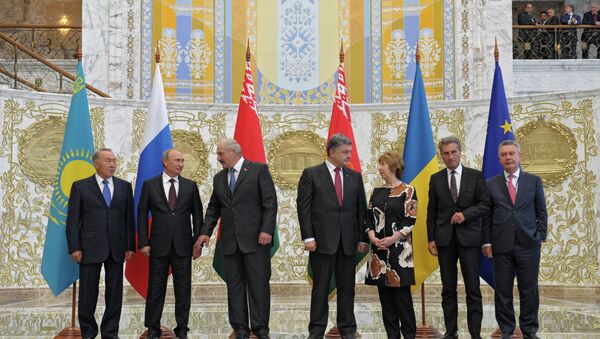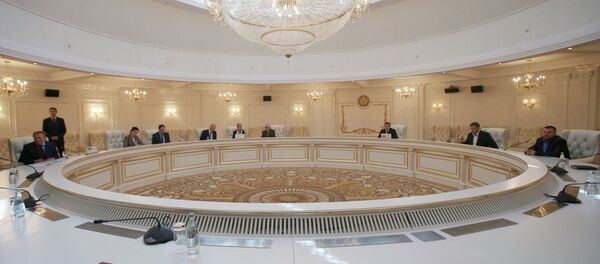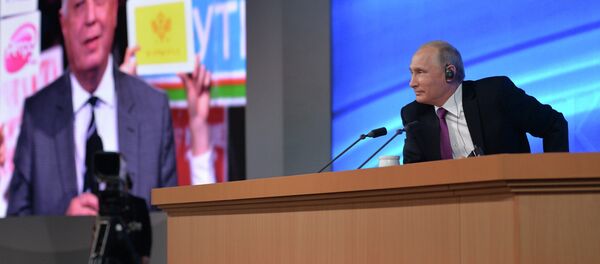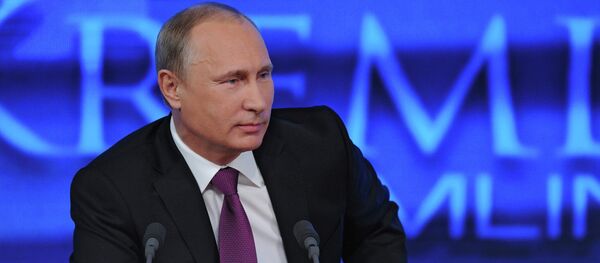MOSCOW, December 23 (Sputnik) — The leaders of Ukraine, Russia, Germany and France have agreed to fresh negotiations of the Contact Group on Ukraine, which are set to be held in Minsk on December 24 and 26. The agreement was reached following telephone conversations between the countries' leaders on Monday. Questions remain about whether the negotiations will take place or be placed on hold once again, and about what the negotiators expect to discuss, what conditions may be agreed upon, and what issues remain unresolved.
The German government has stated that the leaders discussed "concrete proposals for solutions", with France saying that the leaders had called for urgent, "concrete progress" and for the ongoing ceasefire to be "fully respected", Radio Free Europe explained.
Ukrainian President Petro Poroshenko's statement noted that "the participants agreed on the necessity of implementing all points of the Minsk agreement, including the question of the ceasefire…the withdrawal of heavy weapons and also the immediate release of all hostages," Reuters explained.
The leaders of the self-proclaimed Donetsk and Luhansk People's Republics have noted that they have not been issued invitations to the negotiations, but nevertheless recognize their importance. DPR leader Denis Pushilin noted that although he had not been informed or consulted regarding the talks, he recognizes the need for a compromise via negotiations. "Every day without a political solution aggravates the situation, given the increasing number of violations of the ceasefire," Pushilin was cited by RIA Novosti as saying. The LPR's leader, Vladislav Deynego, noted that he is ready to meet "at any time, if an invitation comes."
The talks have been discussed, planned and continually pushed forward since the beginning of December. The latest date follows Belarusian President Alexander Lukashenko's visit to Kiev over the weekend, where he was said to have promised assistance in helping to deliver on a new round of talks. Kazakh President Nursultan Nazarbayev also visited Ukraine last week, where he appealed to Ukraine and Russia to find a solution to the conflict.
Russia Committed To Continued Dialogue, Ceasefire, Humanitarian Assistance to Donbass and its Economic Recovery
In telephone talks last Wednesday between Putin, Poroshenko, Merkel and Hollande, the Kremlin's Press Service noted that for its part, Russia fully supported "the importance of a swift meeting of the Contact Group with the aim of implementing the Minsk agreement and facilitating a dialogue between Kiev and [Ukraine's] southeast." The Kremlin's statement also noted that economic recovery and the provision of humanitarian assistance were discussed.
Putin noted that there are "too many belligerent statements" being made. The Russian president's comments follow statements made by Ukraine's National Security and Defense Council Secretary Oleksandr Turchynov, who said earlier last week that the "war will end only when all the [Ukrainian] territory is liberated, including Crimea." Turchynov's rhetoric was backed up by action this week, the secretary unveiled plans for three new waves of mobilization of Ukraine's military in 2015. Turchynov also announced that by the end of the year, Ukrainian security forces plan on tightening entry controls into the Donbass region.
Road to Peace Must Be Based on Openness and Interaction, Not Building of New Walls
The Russian president noted that Kiev's present policy of economically blockading Donbas, which the UN High Commissioner for Human Rights has described as a human rights fiasco, was an "absolutely futile and destructive" path "for both Ukraine's statehood and people." Putin noted that Kiev needs "to stop building walls and start building a common humanitarian space, a security space, and economic freedom" in order to find a way out of the humanitarian catastrophe. He also explained that for Kiev to restore peace to Ukraine, Ukraine would have to respect the interests of the residents of Donbass, including a political dialogue with representatives of the east, in order to ensure a lasting political settlement.
On the prisoner swap issue, the Russian president noted that Russia's position is that "all [of our prisoners of war] should be swapped for all [of theirs]," although he acknowledged that in practice, "life is harder." Several prisoner swaps have taken place between Kiev and the Donbass republics since the September implementation of the Minsk Accords.
The Minsk Contact Group, which is comprised of representatives from Ukraine, Russia and the Organization for Security and Cooperation in Europe, was formed to find a diplomatic solution to the conflict in eastern Ukraine. The first meeting of the Contact Group in Minsk, Belarus in early September resulted in the September 19 implementation of the Minsk Protocol, an agreement that was mainly geared to establish a ceasefire between the warring parties. Since the signing of the protocol, hundreds of military personnel and civilians have been killed, although at a lower rate than prior to its signing. The protocol's other points include the banning of combat aircraft from flying over the conflict zone, the withdrawal of heavy weaponry, and the withdrawal of foreign fighters from both sides.
According to the United Nations, over than 4,700 people have died and over 10,000 have been wounded during the course of the conflict over the past nine months, with 1,357 killed since the signing of the truce in September.





